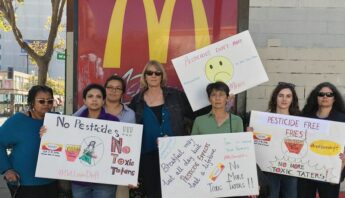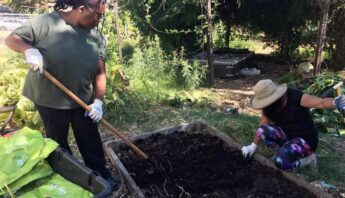For Immediate Release: March 24, 2015
Contact: Paul Towers, 916-216-1082, ptowers@panna.org
Law would utilize vacant lots, promote farm stands
Sacramento, CA – Awaiting a final vote by city councilmembers, community leaders pressed for the final passage of a law that would allow city residents to grow and sell food from their properties, utilize vacant lots for growing food, reduce blight and create new economic opportunities to sell food through on-site farm stands.
“Sacramento has an opportunity to honor its roots and embrace new possibilities,” said Matt Read, coordinator of the Sacramento Urban Agriculture Coalition. “By passing this critical new law, the city sows the seeds for stronger, healthier and economically prosperous neighborhoods.”
After more than two years of discussion with city officials, a diverse coalition of organizations and individuals — including the Sacramento Urban Agriculture Coalition, elected officials, chefs, cultural groups, and urban farmers — urged the City Council to pass the Urban Agriculture Ordinance. In doing so, Sacramento would join the ranks of Los Angeles, San Francisco, Portland and Seattle in promoting urban agriculture within city limits.
“Making urban farming legal sends an important message to people across the City that we recognize the importance of growing and providing food,” said Michael Viscuso, an urban farmer in Sacramento’s Oak Park neighborhood and owner of Urban Sustainable Solutions. “Ensuring the ability to sell from front yard stands, to restaurants and at community markets is critical to the long-term success of urban farmers and the communities they serve.”
The urban ag ordinance as currently proposed would:
- Create commonsense zoning changes so urban agriculture can take place in all zones – residential, commercial and industrial – across the city.
- Allow farmers to sell from urban agriculture stands in front of their homes or businesses during limited days and hours.
- Create property tax incentives for landowners who allow their property, including vacant lots, to be used for urban ag.
“Gardening is great, but adding the option of selling the produce you grow adds all kinds of benefits,” said Paul Trudeau, an urban farmer and owner of Southside Aquaponic Farm. “Small urban agriculture businesses need opportunities to thrive in the marketplace. Farm stands and increased tax incentives are critical elements for our success and enhance the benefits we bring to the community.”
The law has the potential to directly impact low-income and communities of color that often don’t have enough access to fresh fruits and vegetables. According to the Sacramento Hunger Coalition, over 80,000 people in the City of Sacramento alone are considered food insecure. As a result, some councilmembers see the ag ordinance as an opportunity to address some of those challenges.
“Sacramento needs to be more than just Farm-to-Fork. We need to be farm to every fork. The urban agriculture ordinance is an important step in eliminating food deserts and reducing the number of families who are food insecure,” said District 5 City Councilmember Jay Schenirer.
“Now is the time for our city to let our people put food on their own plate and money in their own pockets by matching our rhetoric with policies that support this notion of farm to every fork. This ordinance is a major step toward food security for those most in need,” said District 4 Councilmember Steve Hansen.
As one of the country’s most diverse cities, Sacramento’s cultural and ethnic organizations have also rallied behind the effort, highlighting the value food and farming play in different cultures.
“Urban agriculture is not new to our community – this practice is not only a livelihood for many Southeast Asian families in Sacramento, but has fostered resiliency and a sense of purpose and pride for our elders. This ordinance will also create greater economic opportunities for communities impacted by the recent recession,” said Cha Vang, a community organizer with Hmong Innovating Politics.
Sacramento chefs have also rallied behind the effort, calling on political leaders to advance new laws that would spur greater farming. Over three dozen chefs and food luminaries sent a letter in November urging the City Council to advance legislation.
“Being America’s Farm-to-Fork Capital should mean something to all Sacramentans, not just to farm to table restaurants, foodies and agribusiness. The urban ag law can remind us all of seasonality and our common connection to the ground. And it can bring our urban core closer to our agricultural surroundings,” said Ed Roehr, chef at Magpie, and one of the letter co-authors.
“It pains me to see urban blight, including vacant lots with trash in our city and state Capitol, when I know we can do better. Urban farms are a crucial step in this direction and part of the solution. It’s a win/win, for the city, its residents and property owners, and it helps further strengthen our case that Sacramento is truly America’s Farm-to-Fork Capital,” said Michael Tuohy, executive chef at ESC Sacramento.
While the majority of Sacramento County residents live within the City limits, residents in the unincorporated county would be left out of the new law. As a result, the Sacramento Urban Agriculture Coalition and Supervisor Patrick Kennedy have pledged to take up a similar law with the Board of Supervisors.
###
The Sacramento Urban Agriculture Coalition includes the Alchemist Community Development Corporation, Alliance of Californians for Community Empowerment, Green Restaurants Alliance Sacramento, Pesticide Action Network, ReSoil Sacramento, Sacramentans for Sustainable Community Agriculture, Slow Food Sacramento, Soil Born Farms, Ubuntu Green and Yisrael Family Farm.







